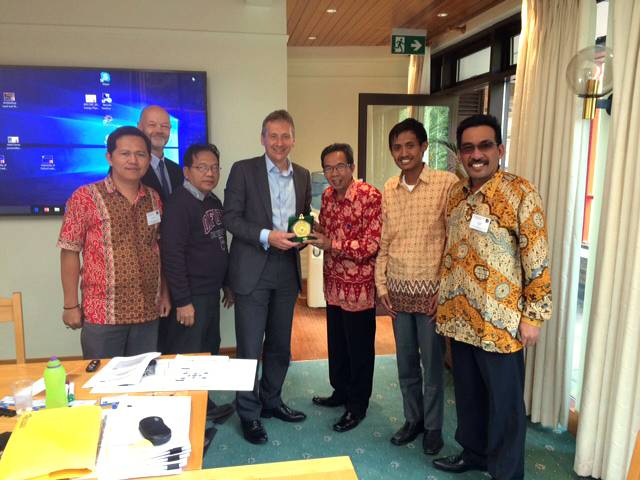How to Become ‘World Class’

Oxford University is recognised as the top university in the world – so it’s not surprising that other universities want to know how Oxford does it. And where better to find out how to be world class than by asking Oxford for a lesson directly?
This autumn, the Department designed and ran a bespoke course in university management for an ambitious Indonesian university with its sights set on becoming ‘world class’.
Universitas Sultan Ageng Tirtayasa, or Untirta, as it’s known, is the only state university in Serang, the capital of Banten province in Java. It currently has six faculties: Agriculture; Teacher Training and Education; Law; Social and Political Sciences; Engineering; and Economics and Business.
Having given the university $50 million from the Islamic Development Bank to help develop its buildings, curricula, staff and research capacity, the Indonesian government sent five high-ranking staff to Oxford for a two-day course in strategic planning for university management.

‘The idea came as I searched the internet for overseas courses,’ explains Dr Maman Fathurrohman, Untirta’s Head of Learning and Curriculum Development. He found that Oxford’s Continuing Education department has a business course in Strategic Planning and Foresight, and contacted us to ask if this could be customised to focus on university management.
It certainly could, and so, this September, Dr John Wilson, a researcher with expertise in education and international human resource development, led the course, talking the Indonesian delegates through what makes a flagship university. He explained that there is no magic formula to success and it’s not something money can buy or which happens overnight. Therefore a university should focus on specific aspects of excellence - a tripartite mission of teaching, research and public service - rather than trying to climb league tables, he counseled.
Among a range of speakers from different universities, Dr Nathan Pike, Director of Training and Higher Education at Oxford’s global innovation consultancy Oxentia, spoke on creating innovative institutions, and Dr Adrian Stokes, Director of Continuing Professional Development and Deputy Director of the Department for Continuing Education, lectured on the subject of continuing education itself.
As well as coming to Oxford, the delegation visited the University of Belfast and University College London’s Institute of Education, as well as sightseeing in Cambridge and around the UK.
It was the delegates’ first visit to Oxford, and they found interesting differences to reflect on from university life in Indonesia. ‘Oxford is old, and, just like old people, it must be idealist and wise,’ says Dr Fathurrohman, ‘while our university is young, new and emerging, and just like young people, we are pragmatic and ambitious. Oxford University is a world-class university, and we would like to be world-class. As religious people, we not only thinking about the world, but also heaven.
He adds: ‘Before visiting the UK, we were thinking that Cambridge University is bigger than Oxford University. After the course, and visiting and sightseeing in Oxford, Cambridge and the UK, we know Oxford University is senior to Cambridge!’
Published 30 January 2018
